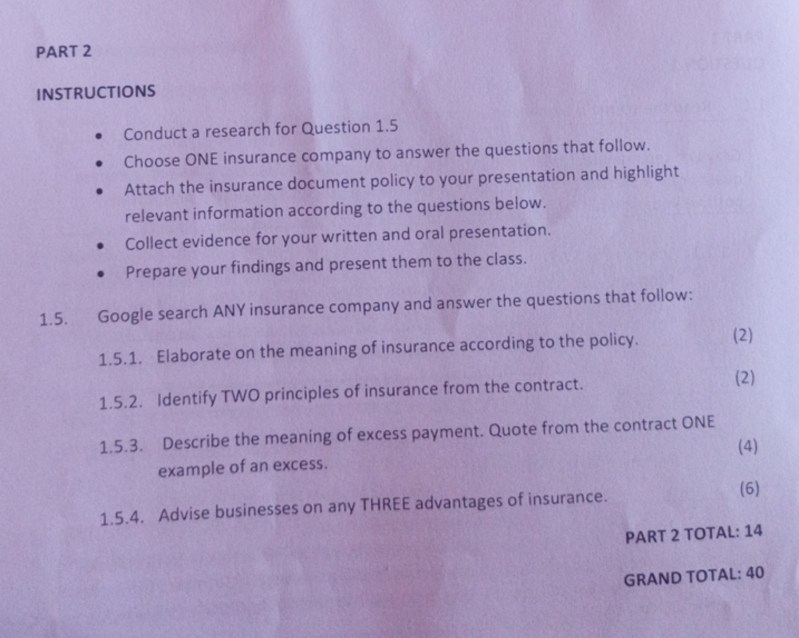Insurance Meaning And Principles – Uberrimae Fidei principle, a Latin phrase which means the principle of good faith is one of the basic principles of insurance that both parties in an insurance contract, that is, the insured and insurance company, should act in good faith in respect of each other.
Therefore, the duty of the insured is to inform the insurance company about all the relevant facts so that the company is fully aware of the risks and can offer suitable coverage by cutting appropriate premium.
Insurance Meaning And Principles

Ubberimae Fidei in Latin is called the principle of good faith, it means that, the insurance and the insurance company, must act in good faith, honesty and fair treatment for each other.
Chapter3 Fundamental Principles Of Insurance Law.
The principle of most honest in insurance is a fundamental principle and this requires that the company is insured and transparent insurance and reveal all the relevant information before you go into an insurance contract
Not to disclose relevant facts that the insurance company cannot make an informed decision whether it will accept the risk or does not accept. This means that the risk taken by the insurance company is different from the risk if all relevant facts were disclosed. If the insurance company becomes aware of the information withheld, the insurance policy can be canceled.
Mr Ramesh bought a life insurance term policy. However, he did not reveal his habit of smoking and drinking when buying the policy. Mr Ramesh withheld retained relevant information would, if disclosed, would lead to a higher premium.
Misinformation means providing incorrect information that exceeds the principle of most honest good. This may also lead to policy cancellation.
Differences Between Fdic And Ncua Insurance
Mr Ajay bought a fire insurance policy when he gave incorrect information about the risk occupancy to get lower premium. When discovered, the insurance company canceled the policy.
Just as the insured is obliged to disclose all the relevant facts to the insurance company, the insurance company is also obliged to have an honestly honest at the insured.
The insurance company has better information about the terms and conditions of the insurance policy. The insurance company is obliged to inform the insurance of the same thing and the failure of the insurance company is to do so.

Therefore, a prospectus insurance company of the insurance policy must be made available to the insured before the purchase, which explains the envelopes, terms and conditions of the policy.
Principles Of Insurance
For insurance demand, the insurance company is obliged to address the investigation and settlement of demand in a fair and straight way. If the insurance company does not act fairly in demand settlement, it is also a breach of duties in good faith.
The duty is needed in good faith at each stage of insurance policy. The insurance company is obliged to keep any change in the risk profile of the subject.
Consider an example where Mr ABC bought factory insurance policy and warehouse. It stores non -hazardous stocks in the warehouse. Now Mr. ABC begins to make a new product requiring hazardous raw material. If this hazardous raw material is stored in the warehouse, the same should be promptly communicated to the insurance company and additional premium for the change in risk occupancy should be paid.
At each renewal, the insurance company should make any change in risk profile and the value of the material to be insured.
Fire Insurance Ll M Iv 24-4
The principle of good faith is one of the basic principles of insurance and ensures that the insurance company and insured have adequate information before a decision is made on the insurance policy.
It helps businesses to get the best insurance envelopes and compare insurance quotations among various insurance companies. If you have any questions about insurance, you can contact us@ or call us on 📞 022-35134695.
Rekha Ramakrishana is a full -time associate editorial director, covering financial products and services. It has more than twenty years of journalistic experience, including 10 years of consumers who trained about personal finances.

Liability insurance policy provides cover for costs and legal damages to which the insured party is lawful liable for laws filed against the insured.
Principles Of Insurance: Principle Of Utmost Good Fai In All Types Of Ins..
Liability insurance is also known as third party insurance as insurance policies pay third parties liability and not the policyholder.
There are many circumstances and situations for daily cases where third parties suffer bodily harm, property damage or financial loss due to company negligence or their personnel. Even if there is no express intention to harm, third parties suffer losses and can sue the company as a result.
Protection against such lawsuits is substantive legal costs and in the case of harmful control, the company may have to pay damages and settlement costs to the party concerned.
Therefore, it is recommended that firms buy adequate liability insurance coverage to protect themselves from different risks they are exposed to, which they may be liable.
Key Person Insurance
His operations, services, employment practices should be invoked by a liability insurance policy. Insurance policies protect the liability of the insured against legal claims made by third parties. Insurance policy begins when a law is filed against the insured for physical injury or property damage or if there is an allegation of unfair action. The Liability Insurance Policy will pay for the protection costs and compensation damages to protect the lawsuit.
For example: the general commercial liabilities of the insured liabilities shall protect the claims allegas of body injury or property damage made within the business premises and an insurance policy shall protect D & D liability against a claim alleging unfair acts by the directors and officials of the company in their management capacity.
Liability insurance policies in the UK were first issued in 1875 when public liability insurance policy was issued to cover liabilities for third parties arising from the use of vehicles driven by a horse. By 1876, there was a clause for indemnity due to boiler policies issued by the engineering department to damage the surrounding property.

Employers’ liability insurance resulted in the Employer Liability Act, 1880 and the Compensation for Workers Act 1897. These two acts were holding the employer liable for accidents suffered by employees during their work.
Types Of Roof Damage In Chicago Covered By Insurance
The passing of the Employers Liability 1880 has also created a claim for public liability insurance policies as employers also had potential liabilities for third parties. As a result, various general liability insurance policies came into effect. The basis of the product liability insurance policy can be traced to the period when public liability insurance policies have been expanded to cover foods and risk for hotels and dermatitis risks for fur and woolen clothing.
There was a steady increase in the demands of Common Law against employers who needed mandatory insurance. Employers’ Liability (Mandatory Insurance) Act, 1969 came into force from 1
Jan, 1979 and this Act mandate employers to adopt insurance coverage against liabilities for physical injury or disease kept during their employment. The Act also provided that a fixed amount of insurance cover may be taken for claims relating to any or more of the employees arising from one occurrence.
In India, the Compensation of Workers Act 1923 added the need for Labor Compensation Insurance Policy and the Motor Vehicles Act, third party liability insurance was required in motor insurance on a mandatory basis. The 1984 Bopal Gas tragedy resulted in an increased demand for public liability insurance due to the increased public awareness of legal rights and remedies.
Basic Principles Of Life And Health Insurance And Annuities Part 1
Other acts such as the Public Liability Insurance Act, 1991 and the Consumer Protection Act, 2019 contributed to the growth of liability insurance in India.
Liability insurance is also subject to similar principles as other insurance lines. The principles of liability insurance are listed below:
The insured has an insurable interest due to the financial loss that may cause the legal liability. The insured person would be liable for legal costs and compensation damages in the case of legal liability.

The principle of indemnity in liability insurance provides that a financial loss can be recovered by a refrigerator only for their insurable interest. This principle provides that the insured should not make a profit from its insurance policy. The purpose of this principle is to place the insurance in the same position after the loss as it was before the loss. In the case of liability insurance, if the insured is legally liable to pay damages to third parties, the insurance policy of the insurance shall be secured by the amount of legal costs, costs and compensation t












